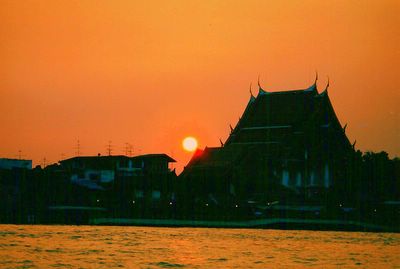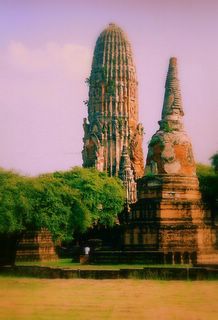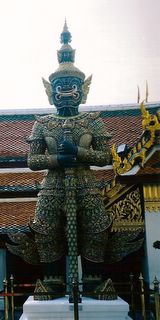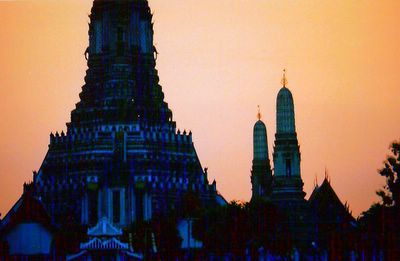
By David Abel | Globe Staff | 11/30/2003
BANGKOK -- Even past midnight, well after the summer monsoons, the stagnant air slides under my clothes, spreading a damp, sticky coating that fills my pores.
It's a greeting of sorts from this sprawling tropical metropolis, one of the hottest cities on the planet.
I have spent more than 24 hours in planes and airports, so the soupy air almost feels pleasant, particularly when it moves. To do that, I hop a tuk-tuk, one of countless motorized rickshaws that provide an airy perch to breathe in all the chaos of the capital's crowded streets the fumes from the lack of catalytic converters, the steam of fried noodles sizzling in sidewalk stalls, the foul aroma of durian fruit, which smell like elephant dung.
As my driver cuts through the traffic, I notice a halo of haze hanging over all of Bangkok, from the muddy, catfish-filled Chao Praya River to the narrow streets packed with wan-looking girls selling sex in Patpong to the massive markets in Chatuchak, where vendors hawk everything from Siamese cats to buckets of live eels to bags of fried grasshoppers.
One of the first things a visitor notices is the incongruous relationship between the grandeur of preserved antiquity and the tackiness of encroaching modernity.
Next to the majestic millennia-old wats,
 those often bejeweled temples housing immense golden sculptures of Buddha, are the neon lights of countless 7-Elevens and Dunkin' Donuts. Saffron-robed monks amble about in sandals, some chatting on cellphones. And on many corners, the state has erected life-size color photos of the king and queen, revered relics of another era who use their monarchy to promote a peaceful, if coup-plagued, democracy of 60 million people.
those often bejeweled temples housing immense golden sculptures of Buddha, are the neon lights of countless 7-Elevens and Dunkin' Donuts. Saffron-robed monks amble about in sandals, some chatting on cellphones. And on many corners, the state has erected life-size color photos of the king and queen, revered relics of another era who use their monarchy to promote a peaceful, if coup-plagued, democracy of 60 million people.My 10-day tour of Thailand begins on an overcrowded ferry that slowly groans down Bangkok's antique central artery, the chocolate-colored Chao Praya River.
Before embarking, I stand on a pier with bamboo supports, watching children empty bags of bread crust into the river. Hundreds of catfish suddenly swarm to the surface, feeding in a frenzy that makes them look like piranhas.
From the river, when I can see above the crowd of commuters boxing me in, I glimpse Bangkok's future and its past.
There's the towering, cabled bridge as sleek as Boston's newest span and the gleaming skyscrapers as opulent and modern as any in the States. Just off the river's banks are the nation's largest, most cherished temples, with one side giving rise to Wat Pho, home of the massive reclining Buddha and neighbor to the glittering, if overwhelming, Grand Palace, and the other to Wat Arun, the ceramic-covered temple of dawn. Floating along the center of the busy waterway, where rusting warships putter past motor-powered gondolas and children ignore the sludge to swim with the catfish, are giant, trash-filled barges, adding their pungency to the humid breeze.
Later, I take the city's new sky train, a smooth-running railway rising some hundred feet over the clogged streets, to the Chatuchak market, a world of hundreds of little worlds that would take days, maybe weeks, to explore.
One section of the market features a kind of zoo, but here the animals monkeys, rabbits, snakes,
 everything from frogs to ferrets and puppies ranging from beagles to bulldogs are for sale. In another part, a warren of small restaurants and fast-food takeouts serve up some of the country's spiciest dishes: unripe mangoes dipped in chili powder, chili-filled pad thai, hot and sour soup diced with small green chilies that seem to explode in your mouth. And stall after stall provides the opportunity to buy pirated DVDs and CDs, orchids and other exotic flowers, large Buddha statues, toy guns, and porn.
everything from frogs to ferrets and puppies ranging from beagles to bulldogs are for sale. In another part, a warren of small restaurants and fast-food takeouts serve up some of the country's spiciest dishes: unripe mangoes dipped in chili powder, chili-filled pad thai, hot and sour soup diced with small green chilies that seem to explode in your mouth. And stall after stall provides the opportunity to buy pirated DVDs and CDs, orchids and other exotic flowers, large Buddha statues, toy guns, and porn.If Bangkok is indeed the world's hottest city, as some surveys claim, the market feels like standing on a planet closer to the sun. To air off, I take another tuk-tuk, and eventually find my way to the infamous Patpong district. The sun by now has disappeared, but as I wait to meet a few tourists and their Thai friends, the air-conditioning beckons from the ubiquitous 7-Elevens seemingly more than in any city I have ever visited.
Unlike the red-light districts of Europe, where the state keeps things relatively tidy and there are fewer accounts of forced prostitution, the narrow streets of Patpong are a free-for-all. Tuk-tuk drivers promise to escort the throng of Western visitors to "pretty ladies," random men surreptitiously flash signs reading "SEX, SEX," and young women in black halter tops solicit with offers for "massages" and tickets to watch them do obscene things with ping-pong balls.
The bedlam of Bangkok, a city of 6 million people that seems to go on and on, has a way of grating quickly, even on a tourist only gawking. So the next morning, for less than a dollar, I take a bus an hour and half to Ayutthaya, the former capital.
Before renting a pair of old, battered bicycles, a new friend and I sit under the scorching sun for a quick lunch of fried eggs and noodles. Well-fed, we tour the spired shrines and regal palaces dating to the 14th century. We dodge elephants on the road and stay hydrated with little bottles of a potent, sugar-filled energy drink.
That evening, after a show of fireworks over the Chao Praya in Bangkok a tribute to President Bush and more than a dozen heads of state in town for a summit among Pacific Rim countries I grab my backpack from the guesthouse where I'm staying and catch a cab back to the airport.
I'm headed north to Chiang Mai, Thailand's second city. It is near the border with Burma and Laos, and in the shadow of the region's giants, India and China, which for centuries have influenced Indochina.
Over the next five days, I indulge in the other side of Thailand the peaceful,
 sybaritic side. To shed my lingering jet lag, I take advantage of the two-hour massages available throughout the city, for as low as 200 baht, or $5. I join treks through the jungle, ride elephants, take bamboo rafts and rubber rafts down white-water rivers. I climb 8,415 feet to the top of Doi Inthanon, the country's highest mountain, swim beneath waterfalls straight out of paradise, and tour local villages where Burmese and Chinese refugees have brought cultures that have changed little over centuries.
sybaritic side. To shed my lingering jet lag, I take advantage of the two-hour massages available throughout the city, for as low as 200 baht, or $5. I join treks through the jungle, ride elephants, take bamboo rafts and rubber rafts down white-water rivers. I climb 8,415 feet to the top of Doi Inthanon, the country's highest mountain, swim beneath waterfalls straight out of paradise, and tour local villages where Burmese and Chinese refugees have brought cultures that have changed little over centuries.Between a regimen of rice noodles, tongue-lashing curries, and banana shakes meals that rarely cost more than 100 baht I attend a "Meet the Monk Night" at a local Buddhist monastery, observe a Thai boxing class , and spend the night at a family's home to learn Thai cooking.
I meet people from around the world in Chiang Mai and sleep only a few hours a night. There's so much to do in such a short time, and I try to lap it up.
This city in the north, on the edge of so much beauty, where doors open on every block to something strange and inviting, where locals invariably greet you with a smile, and where all the senses are easily roused, strikes me as a place I could stop and live for a while. And many Westerners seem to have never left.
But there's another plane to catch. The family that owns and lives at my guesthouse, which feels like home after only a few days, serves me a quick breakfast of banana pancakes, and then I'm off, back to the hothouse of Bangkok.
With only a day left, and a flight to Boston that leaves before dawn the next morning, I store my bag at the airport and set out into the capital again, hoping to grasp onto this city before it begins feeling like a dream.
I walk through the Sunday markets again, eating as much as my stomach will bear, tour the glittering temples of the Grand Palace, where I find the gleaming Emerald Buddha, Thailand's most sacred Buddhist statue since an abbot discovered it in 1434. I walk the city, from the backpacker haven of Khaosan Road, to Ratchadamnoen Klang Ave., Bangkok’s Champs Elysee, to the teeming sidewalks of Chinatown, until my feet burn from blisters.
Around midnight, exhausted, I stop for a massage in a well-lit building off an alley in Chinatown, where a doughy 70-year-old woman lifts me up with the balls of her feet. Two hours later, with the kinks and soreness gone, I take a cab back to Khao San Road, where a party between "farang," as foreigners are called, and locals lasts through dawn.
I take a seat at a bar for my final meal
 in Thailand, and watch a parade of drunken foreigners, vendors, and prostitutes mix it up in what from a distance, with heavy eyes, looks like a carnival. Large German tourists compete for who can eat the most crunchy insects and dried worms. Vendors hawk everything from noodles to tattoos to gewgaws. And the night's unlucky, or hardest working, prostitutes stroll around, propositioning any man who meets their gaze.
in Thailand, and watch a parade of drunken foreigners, vendors, and prostitutes mix it up in what from a distance, with heavy eyes, looks like a carnival. Large German tourists compete for who can eat the most crunchy insects and dried worms. Vendors hawk everything from noodles to tattoos to gewgaws. And the night's unlucky, or hardest working, prostitutes stroll around, propositioning any man who meets their gaze.When a short woman in a long shirt glides past, holding a bouquet of multicolored balloons, it feels like my cue. I finish off my Singha beer, pay my bill, and hail a cab to the airport. As I leave the steam bath of Bangkok, with the sun inching its way over the horizon, I take one more scan of the hazy horizon and offer a "sawitdeecop," or goodbye, to the night.
David Abel can be reached at dabel@globe.com. Follow him on Twitter @davabel.
Copyright, The Boston Globe

